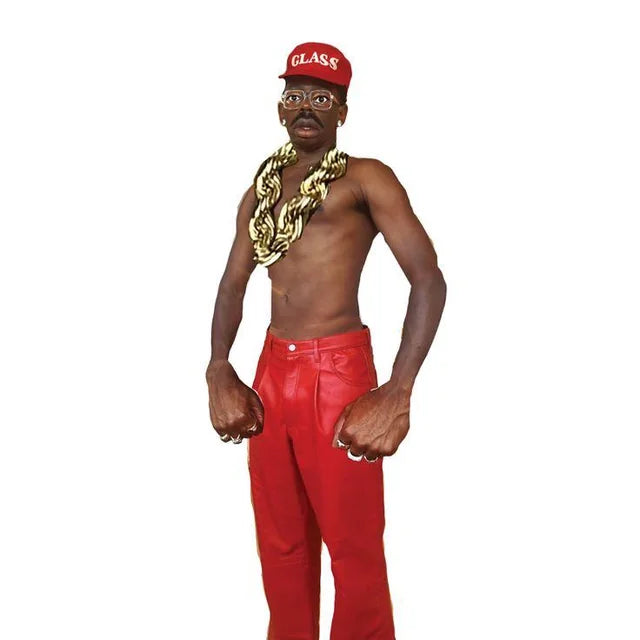
Tyler, The Creator has long transcended the title of “rapper.” He is an architect of emotion, a conductor of chaos, and a designer of soundscapes that defy category. With Don’t Tap That Glass, he continues that evolution—delivering not just an album, but a living, breathing organism of creativity. It’s mischievous and meditative, irreverent yet sincere, a testament to Tyler’s ever-shifting genius and refusal to be pinned down.
From the first seconds of “Big Poe,” the listener is thrown into Tyler’s funhouse—basslines stumble and bounce, synths swirl like carnival smoke, and his voice shifts from playful taunt to sly grin. The track’s energy sets the stage for an album that feels like a guided tour through Tyler’s brain: part jazz club, part arcade, part diary entry.
The production is lush and layered, brimming with contradictions. Deep, fuzzy bass lines coexist with crystalline piano riffs; 80s drum kits brush up against space-age synths. The effect is cinematic—each track a different camera angle on the same restless imagination.
“Sugar On My Tongue” captures the essence of Tyler’s humor and hedonism: buoyant, cheeky, and irresistibly catchy. Yet beneath the bounce lies introspection—those swelling synths and sudden silences hint at something deeper, the ache behind the laughter. That tension—between joy and melancholy, control and collapse—defines the album.
“Sucka Free” threads nostalgia through a futuristic lens, bridging the raw, DIY swagger of his Odd Future days with the refined compositional instincts of Call Me If You Get Lost. It’s Tyler reuniting his past and present selves, turning youthful chaos into something deliberate, almost symphonic.
When the record turns darker with “Mommanem,” the playfulness mutates into eeriness. His flow tightens, his tone drops, and the beats feel like they’re crawling under your skin. Yet Tyler never lets the darkness consume him; he toys with it, balancing fear with wit—turning discomfort into art.
“Stop Playing With Me” bursts with flamboyant bravado, a funky 80s groove pulsing beneath Tyler’s swaggering humor and sharp lyricism. It’s him at his most performative, flexing his ability to sound both ridiculous and profound. In contrast, “Ring Ring Ring” slows the tempo, bathing the listener in a woozy haze of telephone chimes and soulful bass—a hypnotic groove that feels like dialing into nostalgia itself.
The album’s centerpiece, “Don’t Tap That Glass / Tweakin’,” is where Tyler achieves full cohesion. The track distills the entire project’s duality—its playfulness and pathos—into a minimalist yet mesmerizing blend of piano, deep bass, and chant-like repetition. It’s danceable and meditative, silly and sacred all at once. Tyler turns simplicity into transcendence, proving that his most powerful ideas often arrive dressed in absurdity.
Moments like “Don’t You Worry Baby” and “I’ll Take Care of You” soften the palette, introducing warmth and tenderness through lush female harmonies and analog soul textures. These songs offer rest between the mania—a reminder that behind Tyler’s sharp edges lies a sincere heart, still yearning for connection amid chaos.
Lyrically, Tyler continues to walk the tightrope between absurdism and vulnerability. His humor is cutting but self-aware; his introspection is unfiltered, yet never self-pitying. He jokes, mourns, flirts, and reflects—all with the confidence of someone who knows that contradiction is the truest form of honesty.
At its core, Don’t Tap That Glass feels like a thesis on creation itself. Tyler isn’t just performing; he’s exploring what it means to build worlds from impulse, to make art that can laugh and cry in the same breath. Each song functions like a mirror—sometimes warped, sometimes painfully clear—reflecting fragments of a restless genius who can’t stop reinventing himself.
The result is an album that’s endlessly replayable because it refuses to stay still. It moves like thought itself—by turns dazzling, confounding, and achingly human. With Don’t Tap That Glass, Tyler doesn’t just reaffirm his place in music’s upper echelon—he redefines what it means to create.
NOTABLE TRACKS:
Sugar On My Tongue
Stop Playing With Me
Ring Ring Ring

